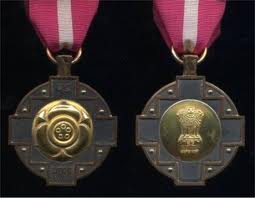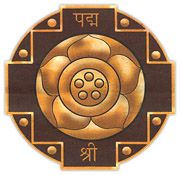Padma awards
(→Padma awards) |
(→Padma Eaters) |
||
| Line 42: | Line 42: | ||
However, the text of the Constitution (for our purposes) is clear: "No title, not being a military or academic distinction, shall be conferred by the State" [Article 18(1)]. Both the prohibition and exception are clear enough. The rest of the article reinforces a republican concern: "No citizen of India shall accept any title from any foreign state" [Article 18(2)]. However, the Supreme Court, which has often made the obvious unobvious, decided through a Constitution bench in the Balaji case (Balaji Raghavan/S.P. Anand vs Union of India, December 15, 1995) that despite the anti-'titles' provision, 'awards' were constitutionally valid. This is reading from the heart, or elsewhere, what the eyes cannot see. The court thought the procedure followed for conferment was hopelessly wishy-washy. The idea that these titles are earned is against the text, which carves an exception only for 'military or academic distinction'. All others are banned. True, the Supreme Court wanted the procedure to be a high-level committee, but its first step of allowing the Bharat Ratna, the Padma awards, the Chakras, and the Arjuna and Phalke awards was totally wrong. | However, the text of the Constitution (for our purposes) is clear: "No title, not being a military or academic distinction, shall be conferred by the State" [Article 18(1)]. Both the prohibition and exception are clear enough. The rest of the article reinforces a republican concern: "No citizen of India shall accept any title from any foreign state" [Article 18(2)]. However, the Supreme Court, which has often made the obvious unobvious, decided through a Constitution bench in the Balaji case (Balaji Raghavan/S.P. Anand vs Union of India, December 15, 1995) that despite the anti-'titles' provision, 'awards' were constitutionally valid. This is reading from the heart, or elsewhere, what the eyes cannot see. The court thought the procedure followed for conferment was hopelessly wishy-washy. The idea that these titles are earned is against the text, which carves an exception only for 'military or academic distinction'. All others are banned. True, the Supreme Court wanted the procedure to be a high-level committee, but its first step of allowing the Bharat Ratna, the Padma awards, the Chakras, and the Arjuna and Phalke awards was totally wrong. | ||
| − | + | Or the overall picture till 2016: Delhi, 793 winners; Maharashtra, 748; Tamil Nadu, 385; East, 372; Northeast, 161. Now what? More for the Northeast? Or is patronage non-political? The UPA, over ten years, gave away 1,169 awards, and the NDA over two years, 215 | |
=The legal aspect= | =The legal aspect= | ||
Revision as of 02:44, 10 January 2018
This article has been sourced from an authoritative, official After the formal launch of their online archival encyclopædia, |
Contents |
The source of the first part of this article
INDIA 2012
A REFERENCE ANNUAL
Compiled by
RESEARCH, REFERENCE AND TRAINING DIVISION
PUBLICATIONS DIVISION
MINISTRY OF INFORMATION AND BROADCASTING
GOVERNMENT OF INDIA
Padma awards
Padma awards are amongst the highest civilian awards of the country. There are three categories of Padma Awards - 'Padma Vibhushan', 'Padma Bhushan' and 'Padma Shri'. These are given for distinguished service in any field including Art, Literature and Education, Science and Engineering, Sports, Medicine, etc. Padma Awards are announced on the eve of the Republic Day every year.
Padma Eaters
Rajeev Dhavan , The Padma eaters “India Today” 10/10/2016
The Constitution had abolished titles. They reappeared after 1950, were abolished again from 1977-80, and made another comeback in 1980. The Napoleonic Mrs Gandhi just had to have a way of rewarding her favourites. But it could only be a title-that-was-not-a bit like Voldemort of the Harry Potter series, the-one-who-must-not-be-named-because the Supreme Court had barred the use of titles as a 'suffix' or 'prefix'. In the Constituent Assembly of 1946, K.T. Shah had wanted a complete abolition of titles, which was naturally opposed by Sir Alladi (Krishnaswamy Iyer). Sir Alladi had the support of Rajaji (C. Rajagopalachari) while K.M. Panikkar chipped in with compromise solutions. Sardar Patel felt titles "were abused for corrupting the public life of the country", but did not want to nullify past honorific titles given by the British. Balkrishna Sharma thought non-heritable titles (e.g., Mahatma) were in sync with Indian tradition, but all princes lost theirs in 1950; they were divested of their privy purses later in 1971. You can see the persisting confusion of minds.
However, the text of the Constitution (for our purposes) is clear: "No title, not being a military or academic distinction, shall be conferred by the State" [Article 18(1)]. Both the prohibition and exception are clear enough. The rest of the article reinforces a republican concern: "No citizen of India shall accept any title from any foreign state" [Article 18(2)]. However, the Supreme Court, which has often made the obvious unobvious, decided through a Constitution bench in the Balaji case (Balaji Raghavan/S.P. Anand vs Union of India, December 15, 1995) that despite the anti-'titles' provision, 'awards' were constitutionally valid. This is reading from the heart, or elsewhere, what the eyes cannot see. The court thought the procedure followed for conferment was hopelessly wishy-washy. The idea that these titles are earned is against the text, which carves an exception only for 'military or academic distinction'. All others are banned. True, the Supreme Court wanted the procedure to be a high-level committee, but its first step of allowing the Bharat Ratna, the Padma awards, the Chakras, and the Arjuna and Phalke awards was totally wrong.
Or the overall picture till 2016: Delhi, 793 winners; Maharashtra, 748; Tamil Nadu, 385; East, 372; Northeast, 161. Now what? More for the Northeast? Or is patronage non-political? The UPA, over ten years, gave away 1,169 awards, and the NDA over two years, 215
The legal aspect
A limit on the number of awards?
Will govt restrict No. of Padma awards?
Dhananjay Mahapatra
The Times of India 2013/08/12
In July 2013, the government issued a revised format for aspirants to apply for Padma awards, the highest state conferred civilian decoration.

in 2017, 89 Padma awards were given away. The highest was in 1972, when 148 were conferred. A look at the list shows that Delhi has won almost a fifth of the top civilian awards, which includes the Bharat Ratna, since 1954. Quite a few of these honours have also gone to foreign nationals and people of Indian origin based abroad...
The Times of India
In the five years 2008-12, the government has conferred over 600 awards—38 Padma Vibhushan, 155 Padma Bhushan and 416 Padma Shri— on people who could be put in three categories—well-known, not so well-known and unknown.
Given the snob value of perceived national (political) recognition through Padma awards, there has been a mad scramble for it in the past.
Every year, a flood of applications deluge a high-level awards committee. Applicants employ the art of verbose eulogy about their achievements. The committee waddles through reams of paper before shortlisting the winners, announced on the eve of Republic Day .
To limit the verbal diarrhoea, the home ministry this year has asked aspirants not to exceed 800 words for their achievements.
How are the awardees selected and do they really deserve the nation’s highest civilian recognition? Is it just political expediency, appeasement, placation or quid pro quo?
Are these akin to titles like Rai Saheb or Rai Bahadur conferred by the colonial masters on their most loyal subjects?
Supreme Court 1995: Balaji Raghavan and S P Anand vs Union of India
Reflection of these questions can be seen in the Supreme Court’s 1995 judgment in Balaji Raghavan and S P Anand vs Union of India. It had said, “During the British occupation, India has had a spate of title hunters who brought degradation and much harm to healthy public life. The title hunters have always been considered a menace to the safe growth of a society.
Though the Padma awards are not titles but in case these awards are given at the whims of the authorities, without a proper criteria and method of selection, they are bound to do more harm to the society than the title-seekers did during the British regime.” Many are genuine achievers and conferment of the awards on them remains beyond the realm of question. But several awardees raise more than a question about their credentials.
Disgusted over indiscriminate conferment of Padma awards, Acharya J B Kriplani had in 1969 moved ‘The Conferment of Decorations on Persons (Abolition) Bill’ in Parliament. N K P Salve, despite agreeing with Kriplani’s concern, had opposed the bill.
Salve had said, “I am aware that the decorations have been bestowed indiscriminately on businessmen and others. In fact, one of my suggestions is that any decoration awarded to any person who is found guilty of any ‘commercial offence’ should be withdrawn. We should be extremely strict about the awarding of decorations. In fact, it is within my knowledge that some of them have put their decorations to commercial exploitation. In fact, a certain managing director of a company wrote a letter to me . On his letterhead was written ‘Ex-Rai Bahadur, Padma Vibhushan’ so and so.”
The Supreme Court in its 1995 judgment disagreed with the petitioners that these awards were akin to titles, which stood abolished by Article 18 of the Constitution.
Amicus curiae Santosh Hegde, who later became a judge of the SC, argued that the Constitution did not envisage state recognition of meritorious services through conferment of awards. But he suggested that to avoid criticism of creating a separate class of awardees, they must not use the awards as either a prefix or suffix to their names.
The court agreed with Hegde’s suggestion but was not averse to conferment of the awards. “The theory of equality does not mandate that merit should not be recognized. In this context, we may refer to the various clauses of Article 51A and specifically clause (j) which exhorts every citizen ‘to strive towards excellence in all spheres of individual and collective activity, so that the nation constantly rises to higher levels of endeavour and achievement’. It is, therefore, necessary that there should be a system of awards and decorations to recognize excellence in the performance of these duties,” the court said.
Should there be a premium put on the awards by limiting the numbers of awardees to a deserving few rather than over a 100 every year? Should the government also put out the reasons why some known performers were rejected or not considered for these awards?
The court had answered this too. “There are no limitations prescribed for the maximum number of awards that can be granted in a given year or the maximum number that is permissible in each category. The Prime Minister’s Committee on Awards & Honours, 1948 had recommended certain limitations in terms of numbers but these have not been incorporated in the extant guidelines,” it said.
While advocating a transparent selection process, the court said, “We may only say that the committee may keep in view our anxiety that the number of awards should not be so large as to dilute their value. We may point out that in some countries, including US, the total number of awards to be given is restricted.”
See also
Padma awards <> Bharat Ratna <> Padma awards: 2010<> Padma awards: 2011<> Padma awards: 2012<> Padma awards: 2014<> Padma awards: 2015<> Padma awards: 2016<> Padma awards: 2017<>



